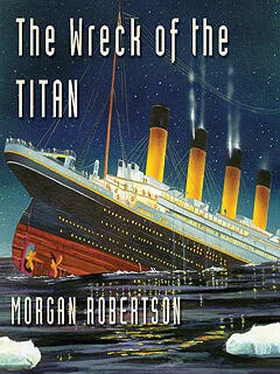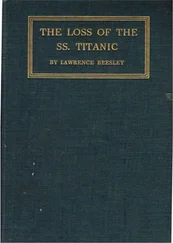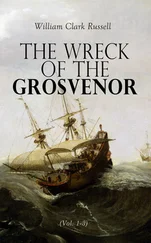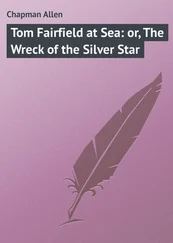“What is it?” he muttered, wearily; “whisky nerves, or the dying flutter of a starved love. Five years, now—and a look from her eyes can stop the blood in my veins—can bring back all the heart-hunger and helplessness, that leads a man to insanity—or this.” He looked at his trembling hand, all scarred and tar-stained, passed on forward, and returned with the sandpaper.
The young woman had been equally affected by the meeting. An expression of mingled surprise and terror had come to her pretty, but rather weak face; and without acknowledging his half-salute, she had caught up a little child from the deck behind her, and turning into the saloon door, hurried to the library, where she sank into a chair beside a military-looking gentleman, who glanced up from a book and remarked: “Seen the sea-serpent, Myra, or the Flying Dutchman? What’s up?”
“Oh, George—no,” she answered in agitated tones. “John Rowland is here—Lieutenant Rowland. I’ve just seen him—he is so changed—he tried to speak to me.”
“Who—that troublesome flame of yours? I never met him, you know, and you haven’t told me much about him. What is he—first cabin?”
“No, he seems to be a common sailor; he is working, and is dressed in old clothes—all dirty. And such a dissipated face, too. He seems to have fallen—so low. And it is all since —”
“Since you soured on him? Well, it is no fault of yours, dear. If a man has it in him he’ll go to the dogs anyhow. How is his sense of injury? Has he a grievance or a grudge? You’re badly upset. What did he say?”
“I don’t know—he said nothing—I’ve always been afraid of him. I’ve met him three times since then, and he puts such a frightful look in his eyes—and he was so violent, and headstrong, and so terribly angry,—that time. He accused me of leading him on, and playing with him; and he said something about an immutable law of chance, and a governing balance of events—that I couldn’t understand, only where he said that for all the suffering we inflict on others, we receive an equal amount ourselves. Then he went away—in such a passion. I’ve imagined ever since that he would take some revenge—he might steal our Myra—our baby.” She strained the smiling child to her breast and went on. “I liked him at first, until I found out that he was an atheist—why, George, he actually denied the existence of God—and to me, a professing Christian.”
“He had a wonderful nerve,” said the husband, with a smile; “didn’t know you very well, I should say.”
“He never seemed the same to me after that,” she resumed; “I felt as though in the presence of something unclean. Yet I thought how glorious it would be if I could save him to God, and tried to convince him of the loving care of Jesus; but he only ridiculed all I hold sacred, and said, that much as he valued my good opinion, he would not be a hypocrite to gain it, and that he would be honest with himself and others, and express his honest unbelief—the idea; as though one could be honest without God’s help—and then, one day, I smelled liquor on his breath—he always smelled of tobacco—and I gave him up. It was then that he that he broke out.”
“Come out and show me this reprobate,” said the husband, rising. They went to the door and the young woman peered out. “He is the last man down there—close to the cabin,” she said as she drew in. The husband stepped out.
“What! that hang-dog ruffian, scouring the ventilator? So, that’s Rowland, of the navy, is it! Well, this is a tumble. Wasn’t he broken for conduct unbecoming an officer? Got roaring drunk at the President’s levee, didn’t he? I think I read of it.”
“I know he lost his position and was terribly disgraced,” answered the wife.
“Well, Myra, the poor devil is harmless now. We’ll be across in a few days, and you needn’t meet him on this broad deck. If he hasn’t lost all sensibility, he’s as embarrassed as you. Better stay in now—it’s getting foggy.”
WHEN the watch turned out at midnight, they found a vicious half-gale blowing from the northeast, which, added to the speed of the steamship, made, so far as effects on her deck went, a fairly uncomfortable whole gale of chilly wind. The head sea, choppy as compared with her great length, dealt the Titan successive blows, each one attended by supplementary tremors to the continuous vibrations of the engines—each one sending a cloud of thick spray aloft that reached the crow’s-nest on the foremast and battered the pilot-house windows on the bridge in a liquid bombardment that would have broken ordinary glass. A fog-bank, into which the ship had plunged in the afternoon, still enveloped her—damp and impenetrable; and into the gray, ever-receding wall ahead, with two deck officers and three lookouts straining sight and hearing to the utmost, the great racer was charging with undiminished speed.
At a quarter past twelve, two men crawled in from the darkness at the ends of the eighty-foot bridge and shouted to the first officer, who had just taken the deck, the names of the men who had relieved them. Backing up to the pilot-house, the officer repeated the names to a quartermaster within, who entered them in the log-book. Then the men vanished—to their coffee and “watch-below.” In a few moments another dripping shape appeared on the bridge and reported the crow’s-nest relief.
“Rowland, you say?” bawled the officer above the howling of the wind.” Is he the man who was lifted aboard, drunk, yesterday?”
“Yes, sir.”
“Is he still drunk?”
“Yes, sir.”
“All right—that’ll do. Enter Rowland in the crow’s-nest, quartermaster,” said the officer; then, making a funnel of his hands, he roared out: “Crow’s-nest, there.”
“Sir,” came the answer, shrill and clear on the gale.
“Keep your eyes open—keep a sharp lookout.”
“Very good, sir.”
“Been a man-o’-war’s-man, I judge, by his answer. They’re no good,” muttered the officer. He resumed his position at the forward side of the bridge where the wooden railing afforded some shelter from the raw wind, and began the long vigil which would only end when the second officer relieved him, four hours later. Conversation—except in the line of duty—was forbidden among the bridge officers of the Titan , and his watchmate, the third officer, stood on the other side of the large bridge binnacle, only leaving this position occasionally to glance in at the compass—which seemed to be his sole duty at sea. Sheltered by one of the deck-houses below, the boatswain and the watch paced back and forth, enjoying the only two hours respite which steamship rules afforded, for the day’s work had ended with the going down of the other watch, and at two o’clock the washing of the ‘tween-deck would begin, as an opening task in the next day’s labor.
By the time one bell had sounded, with its repetition from the crow’s-nest, followed by a long-drawn cry—“all’s well”—from the lookouts, the last of the two thousand passengers had retired, leaving the spacious cabins and steerage in possession of the watchmen; while, sound asleep in his cabin abaft the chart-room was the captain, the commander who never commanded—unless the ship was in danger; for the pilot had charge, making and leaving port, and the officers, at sea.
Two bells were struck and answered; then three, and the boatswain and his men were lighting up for a final smoke, when there rang out overhead a startling cry from the crow’s-nest:
“Something ahead, sir—can’t make it out.”
The first officer sprang to the engine-room telegraph and grasped the lever. “Sing out what you see,” he roared.
Читать дальше











